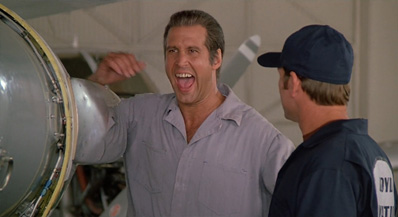|
|
Viking Night: FletchBy Bruce HallJanuary 12, 2016
It’s almost as though certain powerful people decided to put their lives and careers on the line for no particular reason other than to give Chevy Chase an excuse to walk around smirking, rolling his eyes and insulting people for 98 minutes. I get the idea that for Chase, this was less an acting gig than it was an exercise in self entitlement - one that would ruin most other films but here, it’s an approach that’s essential to the role. It’s a funny movie, and Chase is unquestionably in his (narrow) element. But from a storytelling perspective, it’s all a little confusing. But really, that’s okay. Fletch is a competent (if overly complex) mystery, and it’s lots of fun watching Chase weasel his way into and out of one tight spot after another, whether it be jail, a car chase, or Gail Stanwyck. Time hasn’t dulled a witty script, full of clever wordplay and suggestive innuendo. Harold Faltermyer’s score - reminiscent of his work on Beverly Hills Cop - is a little dated, but somehow combines the annoying sparkle of '80s synth pop with the moody, almost noirish atmosphere you want out for a good thriller. Fletch holds up better than it should, and it’s actually fascinating to watch someone solve a mystery using microfilm instead of the Internet, pay phones instead of Skype, and getting on a plane to chase down a lead instead of having Justin Long hack into a computer on the other side of the planet. And OMG, people could smoke on camera and Geena Davis looks like she’s a teenager! Was the world really like this once? Fletch serves as an entertaining window into an era gone by, not just from a comedic standpoint, but also in the sense that one wonders how things might have been different had a once great comedy icon stuck to his bread and butter. Why did he zig instead of zag? Your guess is as good as mine. After all, he’s Chevy Chase, and you’re not.
|

|
|
|

|
Friday, November 1, 2024
© 2024 Box Office Prophets, a division of One Of Us, Inc.


